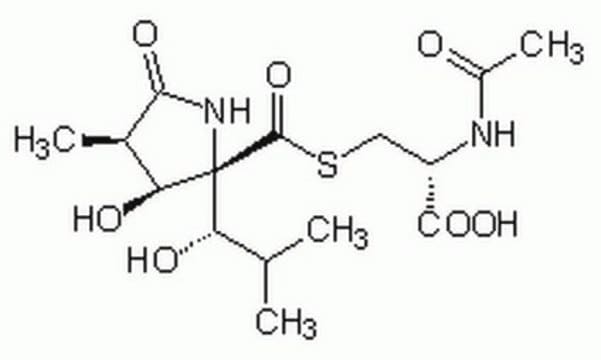474791
MG-132
InSolution, ≥98%, 10 mM, reversible proteasome inhibitor
Szinonimák:
Z-Leu-Leu-Leu-al, Carbobenzoxy-L-leucyl-L-leucyl-L-leucinal, Z-LLL-CHO, Proteasome Inhibitor XI, InSolution MG-132, MG-132
About This Item
Javasolt termékek
Minőségi szint
Teszt
≥98% (HPLC)
Forma
liquid
gyártó/kereskedő neve
Calbiochem®
tárolási körülmény
OK to freeze
protect from light
kiszállítva
wet ice
tárolási hőmérséklet
−20°C
SMILES string
[H]C(=O)[C@H](CC(C)C)NC(=O)[C@H](CC(C)C)NC(=O)[C@H](CC(C)C)NC(=O)OCc1ccccc1
InChI
1S/C26H41N3O5/c1-17(2)12-21(15-30)27-24(31)22(13-18(3)4)28-25(32)23(14-19(5)6)29-26(33)34-16-20-10-8-7-9-11-20/h7-11,15,17-19,21-23H,12-14,16H2,1-6H3,(H,27,31)(H,28,32)(H,29,33)/t21-,22-,23-/m0/s1
Nemzetközi kémiai azonosító kulcs
TZYWCYJVHRLUCT-VABKMULXSA-N
Looking for similar products? Látogasson el ide Útmutató a termékösszehasonlításhoz
Amino Acid Sequence
Általános leírás
Biokémiai/fiziológiai hatások
Kiszerelés
Figyelmeztetés
Fizikai forma
Egyéb megjegyzések
Adams, J., and Stein, R. 1996. Ann. Rep. Med. Chem.31, 279.
Lee, D.H., and Goldberg, A.L. 1996. J. Biol. Chem.271, 27280.
Wiertz, E.J.H.J., et al. 1996. Cell84, 769.
Read, M.A., et al. 1995. Immunity2, 493.
Rock, K.L., et al. 1994. Cell78, 761.
Jogi információk
Tárolási osztály kódja
10 - Combustible liquids
WGK
WGK 2
Lobbanási pont (F)
188.6 °F - closed cup - (Dimethylsulfoxide)
Lobbanási pont (C)
87 °C - closed cup - (Dimethylsulfoxide)
Analitikai tanúsítványok (COA)
Analitikai tanúsítványok (COA) keresése a termék sarzs-/tételszámának megadásával. A sarzs- és tételszámok a termék címkéjén találhatók, a „Lot” vagy „Batch” szavak után.
Már rendelkezik ezzel a termékkel?
Az Ön által nemrégiben megvásárolt termékekre vonatkozó dokumentumokat a Dokumentumtárban találja.
Az ügyfelek ezeket is megtekintették
Related Content
Select different protease inhibitor types based on your needs to prevent protein degradation during isolation and characterization and safeguard proteins in sample prep.
Válasszon különböző proteáz-inhibitor típusokat az igényei alapján, hogy megakadályozza a fehérjék lebomlását az izolálás és jellemzés során, és megóvja a fehérjéket a mintaelőkészítés során.
Tudóscsoportunk valamennyi kutatási területen rendelkezik tapasztalattal, beleértve az élettudományt, az anyagtudományt, a kémiai szintézist, a kromatográfiát, az analitikát és még sok más területet.
Lépjen kapcsolatba a szaktanácsadással










